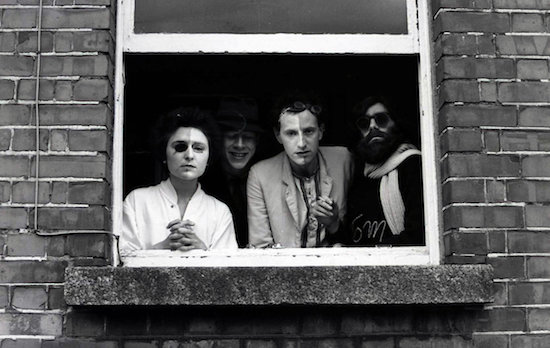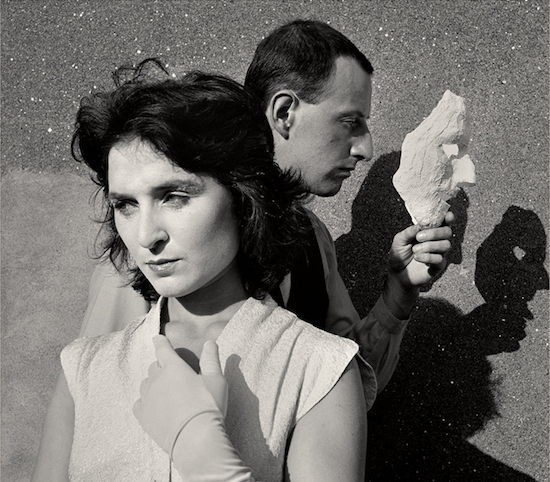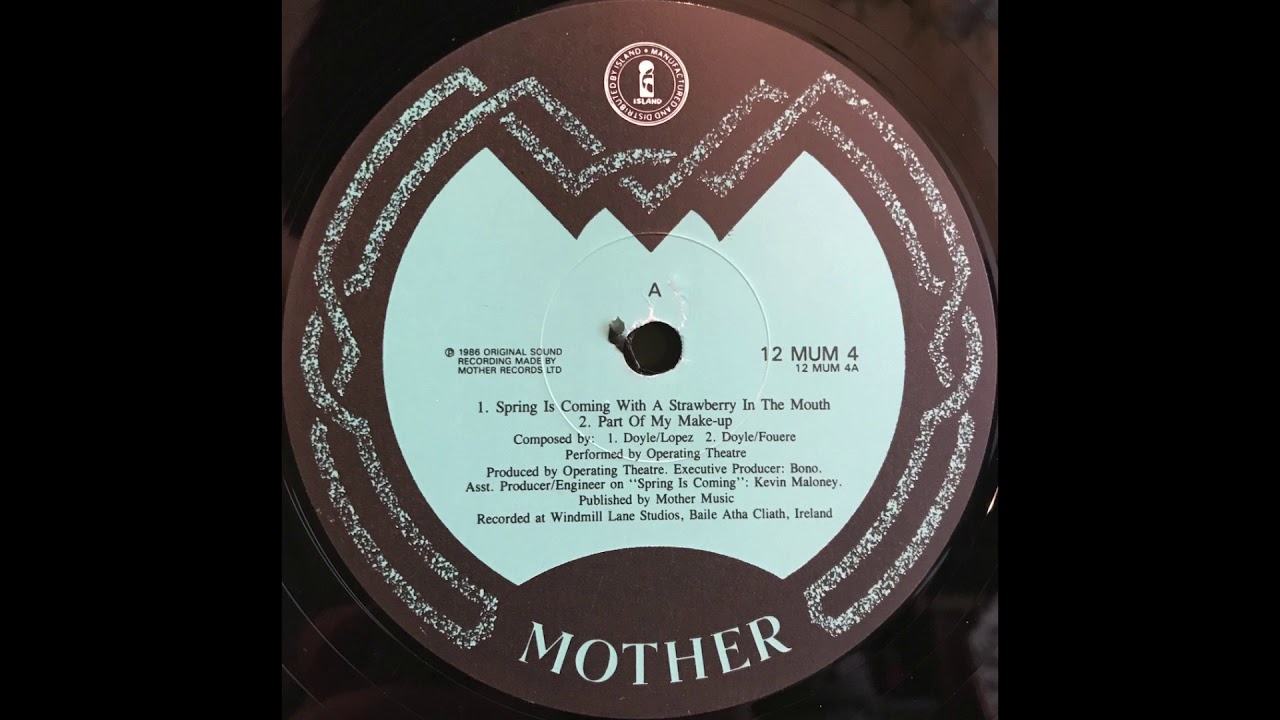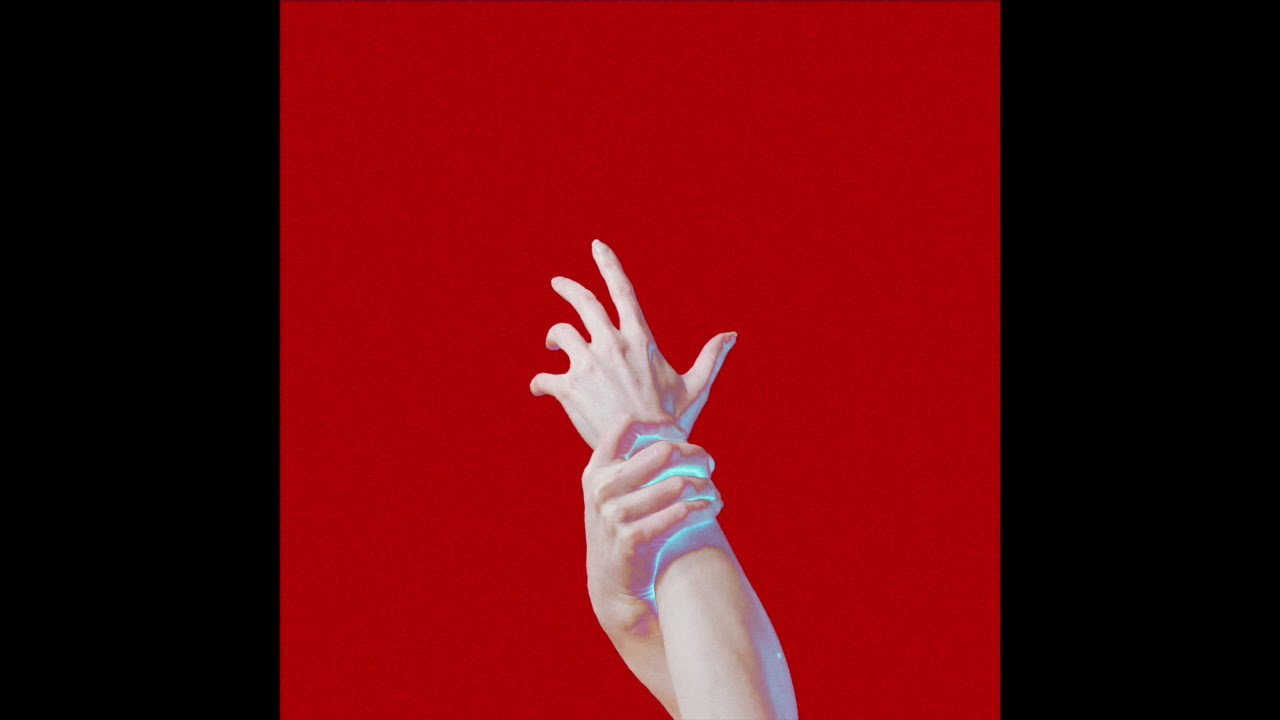It’s 1986, and the ex-frontman of goth punks Virgin Prunes, Gavin Friday, has just walked off stage at Sides DC, Dublin’s new “alternative” nightclub. Replacing him, a man dressed in a theatrical 18th century garb, accompanied by a synth that sounds like a Baroque organ, starts to sing a mournful song. As it ends, he stabs himself in the chest and collapses to the floor. A bouncer has to come and carry him away.
It was a pretty standard procedure for Roger Doyle, the composer and performer of the piece, a musical interpretation of Lorca’s play, The Love Of Don Perlimplín And Belisa In The Garden. Since 1981, Doyle, along with co-founder Olwen Fouéré, had been running the music-theatre company, Operating Theatre – so of course he had fake wooden knife lying around that he could convincingly stick into his chest, with a specially made holder and all.
Fusing strands of pop, experimental electronics and avant-garde theatre, the troupe’s first phase, which lasted until 1988, was febrile and reasonably prolific, but grossly uncelebrated. Its sound anticipated not just the flamboyant new wave that would come to dominate the ‘80s charts, but also an adventurous artistic undergrowth in Ireland that would continue to bubble under the surface for almost four decades.
Now, thanks to the reissue work of All City’s Allchival imprint, and an increasingly mobilised and assured community of modern artists, the rustlings of that undergrowth are being heard farther and wider than ever before. With Allchival’s recent reissue of Operating Theatre’s 1983 debut LP, MIss Mauger, Doyle and Fouéré’s contribution to that landscape is finally getting its due.
The Malahide-born Doyle had spent much of the 70s in studios between the Netherlands and Finland, specialising in musique concrète. Thalia, his 1978 album released, and quickly withdrawn, by CBS Classics is an eerie, intense and at times beautiful electronic patchwork that went on to appear on the coveted Nurse With Wound List. His 1980 opus, Rapid Eye Movements, with its sizzling electronics, delicate pianos and unsettling spoken samples, was then released on Nurse With Wound’s Steven Stapleton’s United Dairies label. It would later be deemed the “Citizen Kane of musique concrète”.
Upon returning to Dublin, Doyle wanted to try something new. “It was then time to examine what I might be able to do with pop-influenced music, which I had always loved,” he tells me over email. Teaming up with Fouéré, an actress, writer and vocalist, the pair recorded Operating Theatre’s first single ‘Austrian’ in 1980, and released it the following year. Miss Mauger came soon after. Released in 1983, and named with a nod with Fouéré’s mother’s family name, the music on the original 10-track LP skirted from the futuristic Fairlight CMI synth excursions of ‘Elation After Hours’, ‘No Come’ and ‘Syllable’ to the triumphant piano and organ chatter of the title track. Fouéré’s vocals on ‘Rampwalk’ and ‘Blue Light & Alpha Waves’ veer from the spritely and histrionic, to the acerbic and raw.
Despite Arts Council Funding and the support of Kabuki Records, a London label with a penchant for signing Irish acts, the album never really took off. Operating Theatre continued in earnest though, with plenty of dramatised performances, and a superb 1986 release on U2’s burgeoning Mother Records, ‘Spring Is Coming With A Strawberry In The Mouth’ featuring vocalist Elena Lopez. The project left a subtle but definite mark on the Irish landscape before being abandoned in 1988.
There was friendship at the core of Operating Theatre, and Doyle has plenty of fond memories of performing both with and in the presence of Fouéré throughout its tenure. Once, during another showcase of the piece based on Lorca’s play at Dublin’s Francis Xavier Hall, he remembers performing with “a chaise longue on stage. My costume got stuck under me and I heard Olwen sick with laughter in the audience, which greatly encouraged me, and got rid of my nerves.”
Aside from that, and the opportunity to play piano on another Allchival reissue, Stano’s Content To Write In I Dine Weathercraft, Doyle’s memories of community in Ireland’s experimental undergrowth are few. Vox, an independent magazine in Dublin, which ran from 1980 to 83 and featured writing from the likes of Mark E. Smith and Cosey Fanni Tutti, specialised in home-grown post punk and new wave, did create some sense of unity, however. Its parties, like the Irrational Cabaret in Dublin’s Project Arts Centre and the Vox Cabaret in Cork, found the likes of Doyle and Michael O’Shea playing alongside like-minded outliers. But next to the countrywide cohesion we see developing now, it makes the strides of the past few decades so much clearer.
The tail end of 2019 has highlighted that, with Dublin Digital Radio’s Fund:it campaign smashing its target for a new studio in mere days, and with Give Us The Night being officially added Dublin City Council Arts Strategic Policy Committee thanks to their tireless work for a better night time economy. As Limerick further establishes itself as Ireland’s most exciting musical city, too, a new move from City and County Council has put plans in motion for a Night Mayor to oversee its development.

All the while, Roger Doyle has remained as active as ever, regularly releasing albums on his Bandcamp, including this year’s The Electrification Of Night. He’s also been composing a virtual electronic opera called iGirl, with the words written by Marina Carr. “But it’s not opera as you think you know,” he says.
Crucially, Doyle’s music is always evolving, and while he’s pleased to see his earlier work being celebrated, he wouldn’t want you to lose sight of the work he’s doing now. “If all this music from the 80s is found to be inspiring, then well and good,” he says. “But let’s not go back there musically.”
The theatrics of Operating Theatre courses through the contemporary Irish landscape in acts like Rising Damp, Meltybrains?, Æ MAK and Áine O’Dwyer, but Doyle would like to see more artists taking inventive, out-there strides in their work. “We need to be reminded again and again that this is the 21st century,” he says. “[It’s] hard to believe but that piece of information hasn’t been absorbed enough. I keep hearing 20th century music believing it’s 21st century music, but it isn’t.”
Below, you’ll find some of the best releases to come out of the Irish undergrowth from September and October, with an honourable mentions owed to Sean Being’s The Brikc on wherethetimegoes.
From motorcycle sound design and enchanting field recordings to hard drum and heartening hip hop, there’s plenty to sink your teeth into here before we return at the start of 2020.
In the meantime, éistigí.

V/A – Wacker That
(Touch Sensitive Records)
Belfast’s Touch Sensitive Records celebrates its fifth anniversary with a new compilation, highlighting artists who’ve previously released on the label, as well as a handful of new contributors from across the island. Honing in on droning, ambient sounds, the 12-track tape features the likes of Barry Lynn, Radio Weirdo and Sonopy, as well as Ai Messiah and Documenta, who have both put out albums through the label in the past year or so. Highlights come from Natalia Beylis and The Altered Hours’ Elaine Howley, whose contribution, ‘Song For Mary Black’ is a melancholic, mesmerising cut of rewinding melodies and comforting muffled vocals.
V/A – 101 Beats Per Minute II
(Countersunk)
The second edition of Dublin experimental label Countersunk’s 101 Beats Per Minute project is as curious and riveting as the first. The formula remains simple enough: artists are tasked with submitting a piece of music, with the only brief being that they be at 101 bpm. Then, every week for 23 weeks, a new track is uploaded to the collection on Bandcamp.
Commencing in April, and having wrapped up in October, the sprawling and wonky electronic compilation features contributions from the likes of Blusher, Amanda Feery, David Kitt, Eomac, Kobina, Sean Mac Erlaine, Linda Buckley and label founder Sunken Foal, among others. The fun of it, given that each track is shared anonymously, is in guessing who made what.
Styles range from the dubbed out, Geogaddi groove of ‘Pwnacon’ and technicolour trip hop of ‘Embouchure’ to the spectral toybox drones of ‘Green Yellow Blue’ and snarling downtempo techno of ‘Sweltered Thru’. “We’re hoping to create a dialogue between a bunch of music makers who might normally work in isolation”, the album’s accompanying text reads. It’s an apt mission statement for a project that joyfully creates another shared space for the outliers of Irish music.
Linda Buckley – ‘Oscillate’
(The Night With…)
As well as featuring on the Countersunk compilation, Glasgow-based composer and artist Linda Buckley has created a new piece for The Night With… – an initiative started by Matthew Whiteside creating commissioning opportunities for young and emerging composers.
The piece, titled ‘Oscillate’, is performed by Duo van Vliet, an accordion and viola combo based in London. Intense and nocturnal, these 13 minutes swell, sprawl and swallow like a thick fog. It sounds like trad from another dimension, with sparse electronics cracking and popping like a bonfire around its flailing melodies, all before it all descends into a low, grumbling and irresistible drone.
Doubt – Steam Cycle
&
Tension – Catalyst VIP
(Flood)
Cork collective, Flood, has become something of a bastion for the sound of hard drum since launching in 2017. With heavy, syncopated percussion and minimal electronic flourishes, the crew have established themselves as regulars at parties like Club Comfort, as well as playing internationally alongside scene originators such as NKC. They’ve also become key reference points for the genre’s development thanks to a slew of digital releases on the label.
The past month has seen two Flood co-founders Doubt and Tension putting out new music, with Doubt’s Steam Cycle marking the label’s first outing since October 2018. It’s a thunderous affair, with Batacuda-like drums bursting across its three cuts as melodic flourishes are lasered in throughout. Tension’s double-header of burly percussion is rougher around the edges, but still bright in all the right places.
Flowers At Night – ‘Lone Planet’, ‘Little Girl’, ‘Mountains of the Moon’
A native of Sherkin Island – home of Ireland’s most adventurous experimental music festival, Open Ear – Juno Cheetal makes music that is as otherworldly as its birthplace. On three new tracks, released through September and October, Cheetal drifts from the Cocteau Twins-invoking melody of ‘Little Girl’ to the spacious ambience of ‘Mountains Of The Moon’ and ‘Low Planet’. The ambient pieces recall Liz Harris’ Nivhek album from earlier this year, while channelling the blustery coast of Sherkin in their expansive, enveloping synth swells and crackling chimes.
‘Mountains of the Moon’ is burly and overcast, and you can practically feel the rain slapping your face as it plays, invigorating as a cold swim. Cheetal’s voice is distant, but bright and comforting like the sun breaking through a dense, foreboding cloud.
Linda O’Keefe – Silent Spring
(Flaming Pines)
Edinburgh-based artist Linda O’Keeffe makes her debut on fellow field recording specialist Kate Carr’s Flaming Pines label with three stunning works of sound manipulation. Described as a meditation on “human and natural sounds, new technologies, and our relationships with other species,” the three pieces on Silent Spring are reflective and engaging.
Created using recordings taken at a hydroelectric dam in Iceland, wind turbine farms in the Terra Alta region of Spain, and in the Brazilian Amazon, each piece fuses sound collages and subtle electronics to reflect on human intervention and abandonment’s impact on natural land and soundscapes. ‘Iceland Reveries’ and ‘Silent Spring’ gurgle and whirr, with the title track also highlighting the quiet, creaking sounds of towns left behind by their young population upon the introduction of automated industry.
‘Strange Birds’ is a primal closer, with the sounds of O’Keeffe and a collaborator, Rebecca, shouting wordlessly into the rainforest on top of a rumbling drone and birdsong making for an affecting meditation on humanity’s dialogue with nature. These are masterstrokes in field recording work, feeling purposeful and complex while also just being fun to just listen to – something many sound artists tend to forget the importance of.
MuRli – The Intangibles
Limerick’s MuRli always flourishes at front-and-centre. While his best known work with God Knows and mynameisjOhn as Rusangano Family is vital and thrilling, there’s a particular, ensnaring urgency to his flow when he gets into the zone as a solo voice. It’s something we heard first back in 2015 on his Surface Tension EP, where his verses dazzled across rapid footwork rhythms and elegant hip hop.
On 2017’s ‘Only The Oppressor Knows Peace’, from Naive Ted’s first The minute particulars mixtape, he pushed that further still, feverishly spitting passages on social division, persecution, art and mental strain over a stampeding beat. The track’s rugged, off-kilter production set a precedent for September’s ‘Illegible’, his first new music in two years, and the prelude to his new terrific new mixtape, The Intangibles. ‘Illegible’ is direct and assured, finding MuRli on form to re-establish himself as one of Ireland’s foremost lyricists, while also stepping up as sole producer for the first time.
On The Intangibles MuRli is curatorial and determined, standing firmly as the lead voice and producer for its 11 tracks while bringing out the very best in his invited vocalists and producers, from Limerick and beyond. Farah Elle’s vocal refrain on ‘Play For Keeps’ fizzes addictively over a languid rhythm, Denise Chalia’s spoken word on the reversed guitar loops of ‘The Enlightenment’ is positively electrifying, and God Knows’ feature on ‘Naufrage’ is a reminder of why they’re such a strong pairing. Throughout the release though, it is MuRli who beams brightest, reinvigorated and reignited.
J Colleran – EP01
(Oyae)
Jack Colleran’s music is always in flux. Having shed his MMOTHS skin in 2018 on the release of his debut album, the Newbridge-born ambient electronic artist ditched the crisp beats and airy pulses that had centered, but ultimately weighed down, his earlier work. His Because Music LP, Gardenia, thrived instead on abstract structures, lucid sound design and sprawling, gossamer-light piano and string arrangements. The music felt freer, unburdened, and more comfortable in itself than anything Colleran had released in the past.
His latest venture, Oyae, a label, shows us that Colleran’s newfound assurance and creative freedom is still blooming, and its first release, EP01, finds him relishing in experimentalism. Walking around Dublin, where the EP was produced, Colleran would listen to drafts and old ideas, and allow the bleeding of external sounds through his headphones to inform what additions he could make to tracks. Drawn to the sound of motorbike engines, Colleran ripped clips from YouTube and processed them using granular synthesis. They ended up forming the EP’s fulcrum, with tracks being totally restructured and woven around these new sounds.
The resulting five tracks are stunning, totally alive and, crucially, human despite their abstraction. ‘Bene’ and ‘S-flood’ are towering ruins of trance, decomposed and sublime, while ‘Arena – crush 44 edit’ and ‘Interframe’ accelerate and launch like arcade game space cars.
Rachael Lavelle – ‘Perpetual Party’
Rachael Lavelle doesn’t release music all too often, but when she does, you can count on it being totally bewitching, and more than a little uncanny. ‘Perpetual Party’ plays out like a fog-drenched vision of your last, hectic internal monologue. Darkly operatic, Lavelle’s avant-garde pop drinks from the same well as Jenny Hval, her bold vocal acrobatics hovering somewhere between the spellbinding incantations of Blood Bitch and the theatrical wriggliness of Irish songwriter Myles Manley.
Lavelle’s voice soars, bursts and diffuses like a smoke bomb over the track’s funereal pulse, her musings on desire – for love, a cold pint, a warm bath – feeling at once mundane and all encompassing. She captures a feeling that is overwhelming, and painfully normal.
Peter Lawlor & Neil Quigley – Hugging
&
Breen – Heaven Is Other People
(Moot Tapes)
Kilkenny experimental imprint Moot Tapes celebrates its first birthday with two new releases, one from Dublin Digital Radio’s Breen, and a split cassette from label founders Peter Lawlor and Neil Quigley.
Breen’s Heaven Is Other People offers four cuts of rough, fizzing house, rave breaks and melodies that swerve and twist like an old banger doing doughnuts in a carpark. The EP closes with Evan Jones’ remix of ‘The Peelers’, taking its alien vocals and crumbling rhythms and turning it into a cavernous techno belter.
On Hugging, Lawlor and Quigley nestle themselves into the eerie electronics and rusty ambience that’s formed the bulk of the label’s output over the past 12 months. Quigley’s ‘Everything Hole (Барлығы тесік)’ fizzles and hisses with ominous, Black Lodgey menace, while ‘Everything Land (Бәрі жер)’ takes you in from the rain with a faint, flickering organ melody. Lawlor’s vignettes veer from fluttering, beatless electronics, atmospheric d&b and distorted walls of guitar. A fine tasting plate of wonky beats, bleeps and drones, and hopefully an indicator of what’s to come from Moot in 2020.




